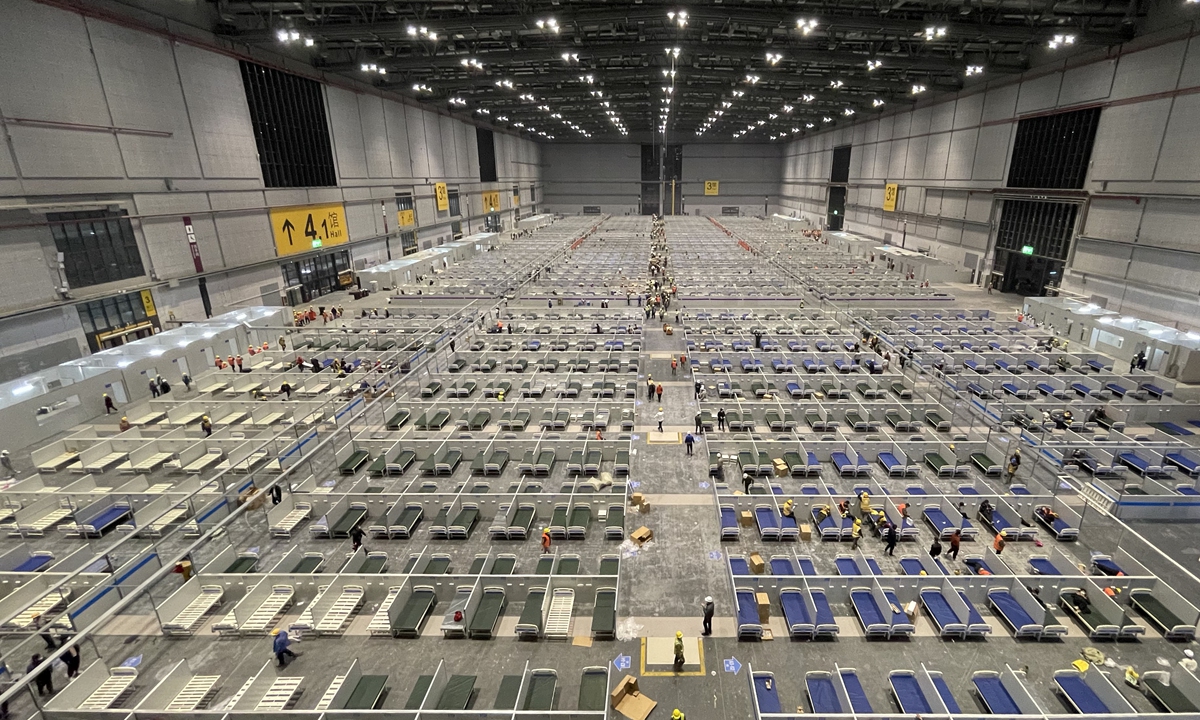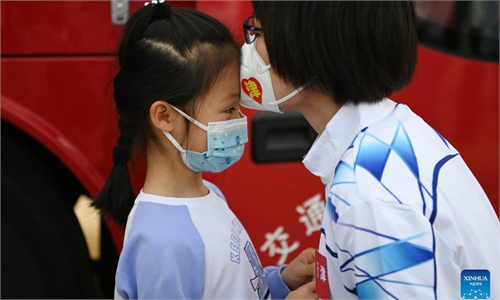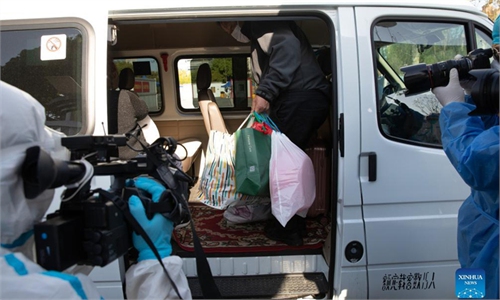
The largest makeshift hospital in Shanghai, renovated from National Convention & Exhibition Center (Shanghai) Photo: Xinhua
Shanghai on Monday registered 994 locally transmitted COVID-19 cases and 22,348 local asymptomatic carriers, the first time the number of asymptomatic infections decreased since April, but the city has to continue strengthening its strict prevention measures as experts noted it still needs time to observe the change of new cases in the near future to judge whether the turning point has come.
The trend will depend on the new data tomorrow and later days, and it will be much clearer if it continues to decline, Li Zhiqiang, leader of the medical team aiding Shanghai from Zhongnan Hospital of Wuhan University, told the Health Times.
Among the cases, 439 confirmed cases and 21,844 silent carriers were detected among closed-loop management. In addition to the number of new infections, another important indicator is where the new cases are found, Li said.
Shanghai residents living in the communities which have had their lockdowns lifted need to take COVID-19 antigen tests twice a week, and the city will stick to the strategy of strengthening control of personnel flows among communities and limiting the size of gatherings, the authorities said on Tuesday.
An epidemic prediction team from Lanzhou University said that this round of epidemic is expected to be controlled around May based on the latest forecast, according to media reports.
The city lifted lockdowns for 7,565 communities after zero COVID-19 positive cases were reported in these regions in the past two weeks. It doesn't mean that residents in these regions can move freely and gather in a large number, as it will cause huge risks in COVID-19 prevention and control, Wu Qianyu, an official from the Shanghai health authority emphasized at Tuesday's press briefing.
Shanghai has classified the areas as either "locked down," "controlled" or "precautionary" based on the screening results and risky situation.
These residents are suggested not to go out of the residential communities unless necessary; and they are not allowed to enter regions under lockdown or that are controlled, the authorities said.
Shanghai has strictly implemented lockdown management and will continue to carry out screening. "Shanghai residents have made arduous efforts and endured difficulties and inconveniences as our common wish is to return to normal life as soon as possible," Wu said, noting that each of the citizens should insist on it and the normal life will come soon.
The relevant opening of supermarkets and stores in Shanghai will be carried out steadily by region and classification, and those strictly implementing epidemic prevention and control measures will have their lockdowns lifted, according to the authorities.
A Shanghai resident whose community has been lifted out of lockdown told the Global Times on Tuesday that each family can only send one person go out to purchase some necessary daily commodities. "The nearby stores are still closed," he said, noting that it would be better to be cautious as the city still sees a large number of new increased cases every day.
As residents under lockdown or controlled still can't go out for shopping, many of them feel it's hard to get daily goods in time. Centralized distribution and package commodities will be the main ways to ensure their daily life, the authorities said on Tuesday. The communities will connect with supermarkets and e-commerce platforms and collect residents' demands to ensure the supply of daily food and other commodities.
State-owned enterprises including Bailian Group and Bright Food Group Co will be responsible for those communities which have been put into lockdown for a long time, the authorities said.
Supermarkets and stores are encouraged to cooperate with postal express and third-party logistics to enhance delivery capacity and special coordinating working groups will be established to help those special groups such as the elderly and people with disabilities, according to the authorities.
The city has been making efforts to increase the delivery capacity. Some e-commerce platforms use the "railway + road" model to deliver food by train to Shanghai.
The communities under lockdown shall timely coordinate volunteers to help those residents who have needs for mental health medication and help them dispense medicines, according to the authorities.
From March 1 to Monday, more than 20,000 people in Shanghai including COVID-19 patients and asymptomatic carriers were discharged from hospital or released from medical observation, according the local authorities. The city has vowed to establish a smooth mechanism to ensure residents return home safely.


